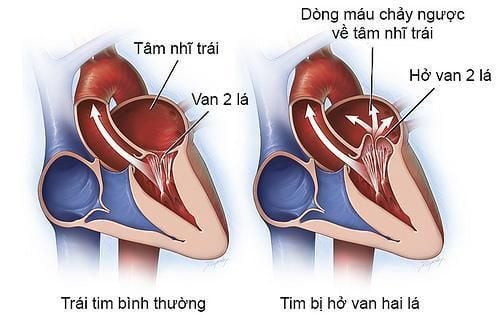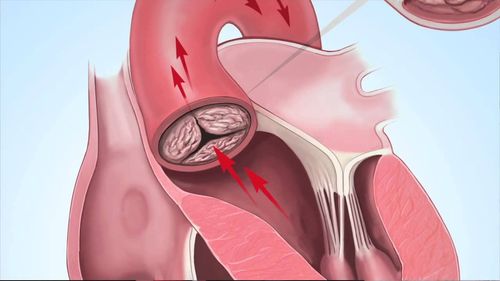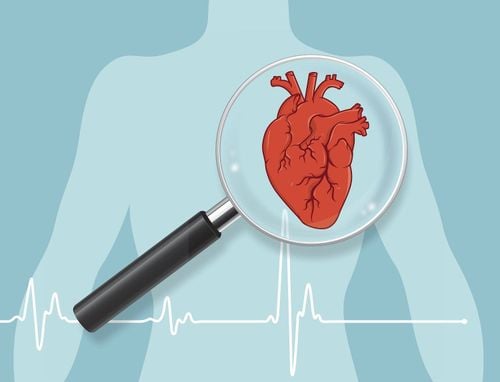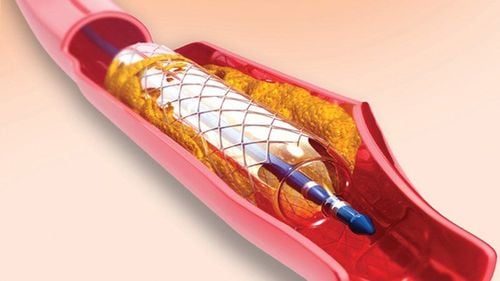This is an automatically translated article.
The article is professionally consulted by Master, Doctor Cao Thanh Tam - Cardiologist - Cardiovascular Center - Vinmec Central Park International General Hospital. Master - Doctor Cao Thanh Tam has many years of experience in the diagnosis and treatment of cardiovascular diseasesMitral regurgitation is a condition in which the two leaflets of this valve do not close tightly, causing some of the blood to back up into the previous heart chambers instead of being pumped to the circulatory system. The severity of the disease depends on the degree of valve regurgitation, symptoms, and associated complications.
1. Signs of mitral regurgitation
Most people with mitral regurgitation have no obvious symptoms because the chambers of the heart tend to dilate to expel more blood because part of the blood the heart pumps throughout the body is regurgitated. through the valve. With this fairly effective compensatory mechanism, people with mild or moderate regurgitation may not have symptoms or complications. Even patients with severe mitral regurgitation in the early stages are asymptomatic until presenting with left-sided heart failure, arrhythmias, or pulmonary hypertension. Patients will have symptoms of heart failure with symptoms such as: Fatigue, shortness of breath on exertion and later appear even at rest, edema of the lower extremities.
Mitral regurgitation 1/4 - mild Mitral regurgitation 1/4 is considered the mildest. If there are no symptoms, it is called physiological valve regurgitation that does not require treatment. If you have symptoms of fatigue, shortness of breath, or chest pain, it is a pathological regurgitation and requires medication to control symptoms.
Mitral regurgitation 2/4 - moderate At this level, there is rarely an indication to replace the valve, but it is easy to change to a more severe degree. Especially; When 2/4 mitral valve regurgitation is accompanied by tricuspid regurgitation, aortic valve regurgitation, or accompanied by hypertension, coronary artery disease, ... it will be more dangerous and should be treated promptly.
Mitral valve regurgitation 3/4 - severity This stage symptoms such as shortness of breath, angina, palpitations, fatigue, dry cough will flare up at the same time and the patient must be hospitalized frequently. than. Many patients with 3/4 mitral regurgitation need valve replacement.
Mitral valve regurgitation 4/4 - very severe degree This is the most severe degree of valve regurgitation, patients are at high risk of death from heart failure, arrhythmias, acute pulmonary edema and acute asthma attacks. In this case, the patient needs active treatment or intervention to replace the heart valve.
Trắc nghiệm: Bạn có hiểu đúng về huyết áp cao không?
Huyết áp cao còn được gọi là kẻ giết người thầm lặng vì bệnh thường không có triệu chứng. Thiếu hụt kiến thức về huyết áp cao có thể làm cho tình trạng bệnh trở nên trầm trọng hơn. Dưới đây là những câu hỏi trắc nghiệm vui giúp bạn hiểu đúng về bệnh cao huyết áp.2. Dangerous complications of mitral regurgitation
Women with mitral regurgitation are at risk of having a baby. Usually, with mild cases, with few symptoms, the patient will adapt quite well to childbirth. But on the contrary, if it is severe, has symptoms or complications, it is very likely that there will be severe complications at birth. If a patient experiences complications from mitral regurgitation, it is best to see a cardiologist for advice on the risks of childbirth and the possibility of surgical repair or replacement of the mitral valve before surgery. pregnant. Except in emergencies, mitral valve surgery is not recommended during pregnancy.Heart failure : A condition when the heart cannot pump enough blood to meet the body's needs. Heart failure usually occurs when mitral regurgitation is not properly monitored and treated, causing the heart to work harder for a while.
Atrial fibrillation in mitral regurgitation: The electrical disturbance in the atrium is manifested by a rapid and irregular atrial rhythm, also known as atrial fibrillation in mitral regurgitation. For patients with mitral regurgitation, the normal amount of blood pumped by the heart has decreased, atrial fibrillation further reduces this blood volume and significantly increases the risk of stroke, or there is a risk of thrombosis in the limbs due to blood clot formation. clots in the chambers of the heart. The disease is treated with anticoagulant drugs and can perform electric shock method to return the rhythm to normal. Patients with atrial fibrillation are recommended to have early surgery when the left atrium is not dilated much to affect the ability to convert during surgery.
Please dial HOTLINE for more information or register for an appointment HERE. Download MyVinmec app to make appointments faster and to manage your bookings easily.














